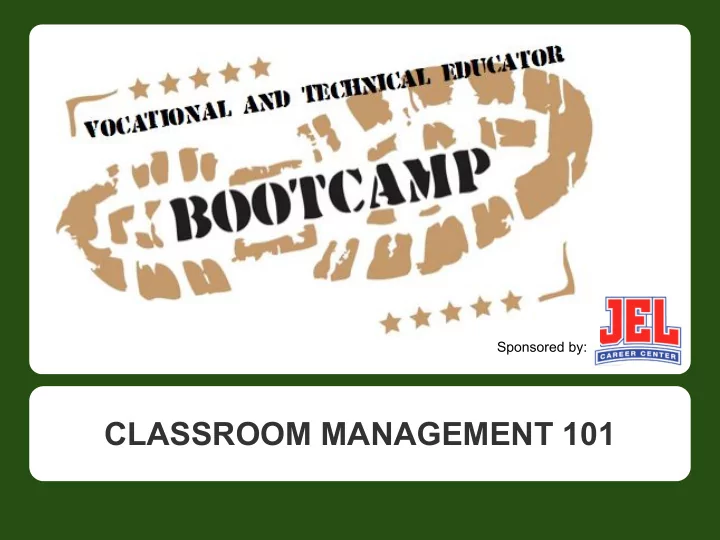

Sponsored by: CLASSROOM MANAGEMENT 101
Bell Ringer
Bell Ringer Instructions: ● Divide into groups of 3-4 people ● You will have 5 minutes to complete as much of your puzzle as possible ● The group with the most-complete puzzle that is closest to the actual design wins.
Bell Ringer Follow Up Questions to Consider ● What were some of the challenges you faced during your task? ● How did your group work together to accomplish your task? ● Did anyone assume a role during your activity? ● How can this be applied to the classroom?
Bell Ringer Follow Up Lessons for the Classroom ● Never Forget the Fun ● Engagement must be constant ● Hook’em Early and Often ● Create a clear path to success with clear objectives and tangible outcomes
Your Facilitators ■ Thomas Hakim ■ Karon Wallace ○ B.A., M.A.T., M.B.A. ○ B.A., M.A.T., M.A. ○ Math Department Chair ○ Assistant Principal @ Northview Middle @ Northview Middle School School ○ Adjunct Professor, Marian University ○ Teach Plus Fellow ○ Teach Plus Fellow ○ We the People District Coordinator ● About Tom… About Karon... ○ Born in Detroit ○ Die-Hard Detroit Sports ○ Born in Philadelphia Fan ○ Dog (Louie)
Greetings “The first step of every effective classroom management plan begins with a warm greeting.” Dr. Rosemary Wong One Minute Greeting! Modeling Age Appropriate Comfort Level
Agenda ● Bell RINGER ● Introductions ● Lesson Planning and Unit Designs ● Project and Inquiry Based Learning ● Quick Tips
Getting them to KNOW what you KNOW? “The best managed classrooms are those that are the best planned and most engaging for students!” ■ Project-Based Learning ○ Trial by Fire ■ Planning for Learning ○ Scaffolding ■ Leading for Learning ○ Classroom Management
Planning for Instruction
Who is "Today's" Student
Inquiry Based Learning ● In inquiry based learning, students take ownership of their learning while studying, researching and doing. ● Inquiry Based Learning is: ○ Engaging ○ Student-Centered ○ Differentiated ○ Promotes Higher Level Thinking ○ Simulate Real World Problems ● Project-Based to Problem Based
Project-Based Learning ● Vocational education is "task-oriented". ● PBL leads students to understanding by DOING. ● It can be both an instructional approach and an assessment approach.
Planning for Instruction
Your Plan 1. Choose two units and/or standards from your first semester.
Your Plan 1. Choose two units and/or standards from your first semester. 2. Complete a quick search for one of the units and email the unit to yourself.
Planning for Instruction ● Objective Checklist ● Course Objectives ○ Scope & Sequence ○ "What do I want the ● Depth vs. Breadth students to know or be ● Prerequisite Order able to do when they ○ Performance complete the unit?" ● What task(s) will they be doing? ● Start with the end in ○ Criteria mind! ● How will they be ○ Learner Centered judged? ○ Action Verbs ● "Student will be able to..."
Making Lesson Plans 1. Lesson Plan Checklist a. Determine "Units" b. Set Sequence c. Select objectives d. Choose presentation method(s) e. Choose support materials f. Determine student assignments g. Set evaluation * Allow time for development.
Lesson Planning 101 ● Use lesson plans to create a roadmap to student learning. ● Remain flexible but have deadlines. ● Leave room for re-teaching. ● Plan goal-based instruction, then assess. ● Keep good records (you can reuse them) ● MOST IMPORTANTLY...Share!!! ○ No need to reinvent the wheel. ○ Good teachers borrow, great teachers steal
Great Resources
Classroom Leadership
First Day/Every Day Q & A (Discussion)
Classroom Leadership Strategies we’ll highlight: 12: Right Is Right (p.100) 45: Threshold (p.353) 50: Do It Again (p.373) Chapter 11: High Behavioral Expectations (p.381) Chapter 12: Building Character and Trust (p.423)
Fantastic in Five Minutes Previewing the Text 1. Read the Title 2. Glance at Pictures 3. Turn to Page 86 4. Make a check mark next to a strength
Recommend
More recommend